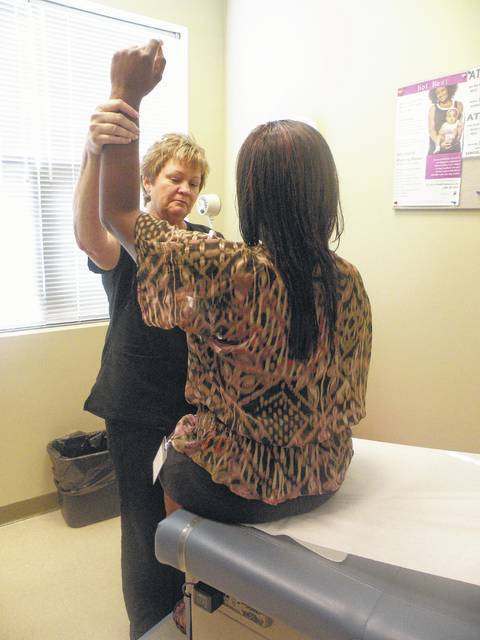Local healthcare officials continue to spread awareness of breast cancer, as more and more women are diagnosed with the deadly disease each year.
In Sampson County, a projected 66 cases of breast cancer or expected to be diagnosed in 2017. Through the Sampson County chapter of the Breast and Cervical Cancer Control Program, the local health department is working to make more women aware of the risks involved with breast and cervical cancer.
According to Luke Smith, public health educator with the Sampson County Health Department, NC BCCCP provides free or low-cost breast and cervical cancer screenings and follow-ups to eligible women in North Carolina.
Emily Spell, RN with the Sampson County Health Department, said women in the U.S. have a greater chance of dying from breast cancer than from any other cancer, besides lung cancer. About one in eight women will develop invasive breast cancer over the course of their lifetime.
In addition to the projected new cases of female breast cancer, there are nine projected deaths due to female breast cancer in Sampson County.
Spell and Smith, along with other officials at the local health agency, are working through the BCCCP program to help raise women’s awareness of the this deadly disease and offer ways to detect problems earlier.
“The Sampson County BCCCP Advisory Board exists to educate and inform the community of the importance of early detection and treatment of breast and cervical cancer,” Smith pointed out. “The BCCCP Advisory Board urges women to take advantage of the NC BCCCP offered through the local health department and other clinics to help with the cost of breast and cervical cancer screenings.”
For nearly two decades, the Sampson County Health Department has made fighting breast cancer an important part of women’s health care.
“Sampson County Health Department has been participating in the North Carolina Breast and Cervical Cancer Control program for 19 years,” Spell said. “In that 19 years, we have helped over 1,000 women get screenings for Breast and Cervical Cancer and we have helped women receive treatment for the unfortunate diagnosis of breast or cervical cancer therefore, providing many women with hope.”
According to Smith, early detection is an important key in women’s breast health and the BCCCP program helps aide women in early detection.
“Early detection is the best protection,” she attested. “Breast cancer screenings (mammograms) lead to early treatment and increased survival rates. The program is very beneficial to women. The program is for women that have little or no health insurance and if not for the program, these women may not get screened due to the cost.”
Smith advised that women should receive regular screenings and encouraged all women to get screened. She said BCCCP services are extremely important for early detection and that the earlier cancer is found and treated, the better the outcome.
“Risk factors for breast cancer include, but are not limited to, just being a woman, age (your risk increases as you get older), family history, and race or ethnicity,” Smith advised.
According to Smith, African Americans, Hispanics and Asians are at a higher risk for breast cancer.
“While these are factors that we cannot change, there are other risk factors that we can change,” Smith said. “For example being overweight, smoking, eating unhealthy… By educating women on breast cancer facts, risks, and screenings, we want to make sure the risk of getting breast cancer is as low as possible.”
Cancer, both Spell and Smith admit, isn’t prejudice. It can, and will, strike any woman, at any age, of any ethnic and socioeconomic background.
“Everybody has been touched in their life in one way or another by cancer, either by personal experience, or with a family member,” Spell said. “So let’s promote this great program, bring information to your family, friends, churches, or other gatherings. Explain the importance of annual screenings and maybe together we could be the reason why breast and cervical cancer diagnosis drop across our state and country.”
The NC BCCCP, Smith said, is funded by the U.S. Centers for Disease Control and Prevention. North Carolina’s programs are managed by the Division of Public Health of the N.C. Department of Health and Human Services.
Services through NC BCCCP are provided for women in North Carolina who are uninsured or underinsured; without Medicare Part B or Medicaid; between the ages of 40 and 64 for breast screening services and 21 and 64 for cervical screening services; and have a household income at or below 250 percent of the federal poverty level.
For more information about NC BCCCP, contact the health department at 592-1131 ext. 4214 or 4240; visit sampsonbcccp.org, www.bcccp.ncdhhs.gov or call 1-800-662-7030.

